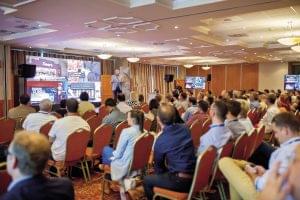Magazine: No borders in logistics either
Ecommerce Hungary organised the 15th Ecommerce Conference with the motto ‘Intelligent without Borders’. Last year online retail sales amounted to HUF 545 billion in Hungary – told the first speaker Gergely Kis, managing director of eNet Internetkutató és Tanácsadó Kft. In addition to this sum, Hungarians also spent approximately HUF 400 billion in online shops registered abroad. This represents 6.2 percent of total retail sales (excluding motor fuel and vehicle sales). Which areas are driving sales? Consumer electronics and information technology, but fashion sales are also growing fast. The strong price competition is good for shoppers but creates challenges for retailers. Mr Kis’ view is that it is better to compete with services than in prices.
Gergő Törőcsik from DHL Express Magyarország Kft. revealed that every tenth international delivery is an express one. He added that sales of those online shops that offer express delivery are growing 60 percent faster. Shoppers need to pay for express delivery, but their reaction to this is buying more. Shoppers that belong to Generation Y or those even younger first check the delivery and payment conditions of the given online shop, and only decide whether to buy there afterwards. DHL Express Magyarország Kft. offers different delivery options in different product categories. Very often retailers undervalue their own products and say they don’t need express delivery. DHL’s vies: Let the shopper decide!

László Czibulya, head of sales at Invitech Solutions analysed the 2013-2017 period, when the number of consumers buying online grew from 2 to 3 million; in the same period the basket value also grew. He reckons that online sales augmented by approximately 16 percent in Hungary last year – twice as fast as the retail average. Mr Czibulya introduced the virtual server service, which is economical and monthly costs are easier to plan. For instance when a promotion campaign is about to be implemented, the company knows the IT costs in advance. The service is flexible and it can be expanded without having to interrupt the service.
Communication logistics specialist Walter Trezek spoke about the changes in e-commerce from 1 January 2021, and the opportunities that they create. In Europe the digital single market will become reality. From the date mentioned above crossing the border with goods will be impossible if certain data aren’t sent to the authorities in advance, neither from an EU member state nor from a third country. Each parcel will have an identification that will play an important role in the open supply chain, making it possible to communicate with the retailer directly about its contents.
During the High Performance e-commerce roundtable Balázs Várkonyi, managing director of Extreme Digital revealed that their management prepares annual – at product level – and 5-year business plans. Szallas.hu’s managing director József Szigetvári opined that planning very much depends on size: at the beginning they had made monthly reports and had prepared quarterly plans, but above HUF 5-billion sales they started making annual plans; later 5-year plans followed.

Mr Szigetvári believes that the lack of workforce hinders development and blocks further expansion. He added that this isn’t a competitive disadvantage as the problem affects every company in Hungary, but the big problem is that the real competitors aren’t here, e.g. Booking is based in Amsterdam. Róbert Sztípity, founder and managing director of Shopbuilder Kft. revealed that the labour force shortage is a problem for them too. He added that from time to time they need to change what they do themselves and what it is that they try to outsource. István Zabari, the founder of Lumenet told that the company’s development isn’t obstructed by don’t having enough workers, but they had also had the experience of much fewer people applying for positions than before.
In 2018 the prestigious Online Retailer of the Year awards were presented for the 12th time. In the small and medium-sized company category Lumenet finished first, while among large companies Media Markt was the best. Special awards were also distributed. In the large company category Decathlon’s online shop won the Best Omnichannel and Most Innovative Retailer prizes, the prize for the Best User Experience went to G’Roby and Tchibo was rewarded for the Best Online Campaign. In the small and medium-sized company category Alinda won the Best Omnichannel prize, while Lumenet went home with the Best User Experience and the Most Innovative Retailer prizes. Whiskynet won the award for the Best Online Campaign. Mastercard was the main sponsor of Online Retailer of the Year 2018. Endre Eölyüs, Mastercard’s country manager for Hungary and Slovenia told: they are happy to see that Hungarians do like to buy online. //
Related news
AI agents are coming to the checkout – a new era in online commerce
🎧 Hallgasd a cikket: Lejátszás Szünet Folytatás Leállítás Nyelv: Auto…
Read more >New programme to support the digitalisation of Hungarian businesses
🎧 Hallgasd a cikket: Lejátszás Szünet Folytatás Leállítás Nyelv: Auto…
Read more >Related news
MOHU: 5,200 return points are in operation, but 47 larger settlements still do not have RE points – public “enema” machines may be introduced
🎧 Hallgasd a cikket: Lejátszás Szünet Folytatás Leállítás Nyelv: Auto…
Read more >Change in Rossmann Hungary’s leadership: Kornél Németh decided to move towards new challenges in 2026
🎧 Hallgasd a cikket: Lejátszás Szünet Folytatás Leállítás Nyelv: Auto…
Read more >









